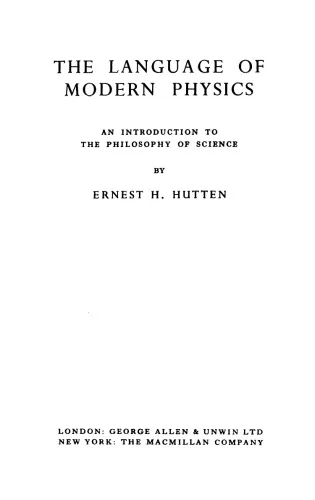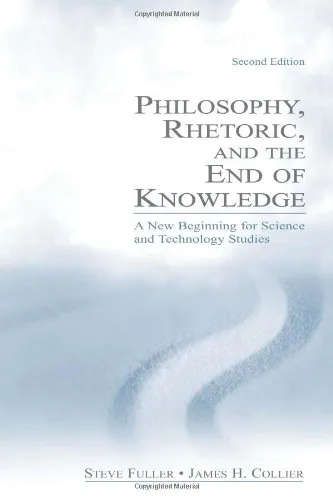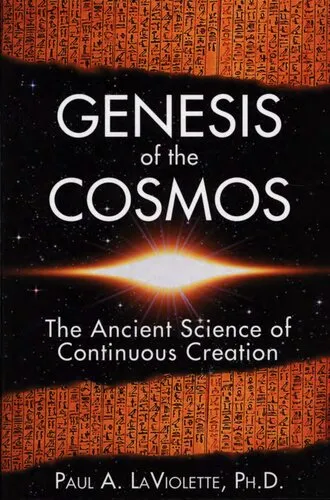EPSA Philosophical Issues in the Sciences: Launch of the European Philosophy of Science Association
4.0
بر اساس نظر کاربران

شما میتونید سوالاتتون در باره کتاب رو از هوش مصنوعیش بعد از ورود بپرسید
هر دانلود یا پرسش از هوش مصنوعی 2 امتیاز لازم دارد، برای بدست آوردن امتیاز رایگان، به صفحه ی راهنمای امتیازات سر بزنید و یک سری کار ارزشمند انجام بدینکتاب های مرتبط:
معرفی کتاب «EPSA Philosophical Issues in the Sciences: Launch of the European Philosophy of Science Association»
کتاب «EPSA Philosophical Issues in the Sciences: Launch of the European Philosophy of Science Association» اثری فاخر و جامع است که به مباحث فلسفی در علوم پرداخته و به مناسبت تأسیس «انجمن اروپایی فلسفۀ علم»، گردآوری و منتشر شده است. این کتاب مجموعهای از مقالات منتخب نویسندگان برجستۀ حوزه فلسفه علم را شامل میشود که در کنفرانس افتتاحیه این انجمن ارائه شدهاند. هدف اصلی این اثر، پرداختن به چالشهای فلسفی در علم و بررسی موضوعات اساسی در مرزهای دانش است. در ادامه، بخشهای مختلفی که به معرفی عمیقتر این اثر ارزشمند کمک میکنند، آورده شده است.
خلاصۀ مفصل کتاب
این کتاب گردآوری مجموعهای از مقالات علمی است که در زمینههای مختلف فلسفه علم بحث میکنند. موضوعات اصلی که در این کتاب پوشش داده شدهاند، شامل فلسفۀ فیزیک، فلسفۀ زیستشناسی، فلسفه روانشناسی، و مسائل متافیزیکی مرتبط با علم است. هر بخش از کتاب توسط اساتید و پژوهشگران برجسته در حوزه مورد نظر نوشتهشده و رویکردهای متنوعی برای بررسی پرسشهای بزرگ فلسفی در علم به کار گرفتهاند. به عنوان مثال، در برخی مقالات بر پیچیدگی نظریههای علمی و چگونگی پذیرفته شدن یا رد آنها تأکید شده است، در حالی که دیگر مقالات به تحلیل نقش Context of Discovery و Context of Justification میپردازند.
رویکرد بینرشتهای این کتاب ارزش زیادی به آن داده است، زیرا دانشمندان و فیلسوفان از زمینههای مختلف علمی گرد هم آمدهاند تا درک ما از علم و روشهای آن گسترش یابد. این کتاب نه تنها به مخاطبان علمی و متخصصان فلسفه علم کمک میکند بلکه دانشجویان و پژوهشگران تازهکار نیز میتوانند از آن بهرهمند شوند.
دستاوردهای کلیدی
- درک عمیقتر از فلسفۀ علم به عنوان یک حوزه میانرشتهای.
- تحلیل دقیق مسائل بنیادی همچون وضعیت متافیزیکی قوانین علمی و نظریهها.
- بررسی چالشهای روششناختی و اپیستمولوژیکی در علوم مختلف همچون فیزیک و زیستشناسی.
- ارائۀ دیدگاههای جدید و تحلیلی دربارۀ نقش شانس، احتمالات، و عدم قطعیت در نظریههای علمی.
- پررنگ ساختن اهمیت همکاری بین فلسفه و علوم برای توسعۀ نظری و عملی دانش.
جملات مشهور از کتاب
«تفاوتهای بین Context of Discovery و Context of Justification ممکن است مستقیمترین راه برای درک چیستی علم باشد.»
«علم بدون ساختاری فلسفی، تبدیل به مجموعهای از دادههای پراکنده میشود، اما فلسفه بدون علم به یک تخیل بیپایه فروخواهد کاست.»
چرا این کتاب مهم است؟
کتاب حاضر نقطه عطفی در فلسفۀ اروپایی علم محسوب میشود. اولین تلاش جامع در گردآوری دیدگاههای فلسفی منسجم در علوم بوده و استانداردی برای بررسی سیستماتیک مسائل فلسفی در علوم فراهم کرده است. علاوه بر این، این اثر به ایجاد پلی بین رشتههای مختلف علمی و فلسفی کمک کرده و به همگرایی این دو بخش مهم از دانش بشری پرداخته است.
برای هر شخصی که به علم و فلسفه علاقهمند است، این کتاب به مثابه یک راهنماست که دیدگاههای مهم در فلسفه علم را از طریق بهترین آثار ارائه میکند. همچنین، با تمرکز بر مسائل مدرن و بحثبرانگیز نظیر Probabilistic Inference و Evolutionary Biology، این اثر بینشی نوین به خوانندگان منتقل میکند. با مطالعه این کتاب، خواننده قادر خواهد بود اهمیت فلسفه در پیشرفتهای علمی و تکنولوژیکی امروز را بهتر درک کند.
Introduction to 'EPSA Philosophical Issues in the Sciences: Launch of the European Philosophy of Science Association'
Welcome to an in-depth exploration of 'EPSA Philosophical Issues in the Sciences: Launch of the European Philosophy of Science Association', a remarkable compilation edited by Mauricio Suárez, Mauro Dorato, and Miklós Rédei. This groundbreaking book marks the pivotal launch of the European Philosophy of Science Association (EPSA), an organization dedicated to fostering collaboration and dialogue among philosophers of science across Europe and beyond. In this book, you'll find a rich, diverse collection of essays that examine philosophical questions at the intersection of science, epistemology, and metaphysics.
The volume is a celebration of the intellectual depth and breadth of the philosophy of science as a discipline. It addresses pressing concerns in the scientific community, ranging from the interpretation of scientific theories to foundational questions about scientific realism, causation, probability, and the nature of laws. The book provides not only a state-of-the-art overview but also advances novel arguments and perspectives. This makes it indispensable reading for anyone passionate about the philosophy of science or the intricate philosophical challenges posed by scientific inquiry.
Detailed Summary of the Book
The essays featured in this volume are categorized into thematic sections, touching upon some of the most debated areas in the philosophy of science. Among the topics discussed are the epistemology of scientific models, the nature of explanation, and the role of idealization in scientific practice. The collection provides in-depth examinations of metaphysical issues, such as the nature of causality and the interpretation of quantum mechanics, offering both historical insights and innovative philosophical arguments.
The book also addresses practical concerns, such as ethics in scientific research and the sociological underpinnings of scientific knowledge. The contributors include leading philosophers of science, whose varied perspectives ensure a pluralistic and dynamic treatment of the subject matter. As such, the volume contributes to both theoretical advances and real-world applications, showcasing the relevance of philosophy to contemporary science.
Whether you are a philosopher, scientist, or anyone interested in understanding how philosophical perspectives shape and are shaped by scientific discovery, this book provides a comprehensive toolkit to navigate these complex intersections.
Key Takeaways
- A rich exploration of foundational challenges in the philosophy of science, including realism and anti-realism debates.
- Novel arguments regarding the interpretation of scientific models and theories.
- Insights into the role of ethics and socio-political factors in the practice and advancement of science.
- Contributions from leading philosophers, making this a definitive work in the field.
- A structural overview of how philosophy can inform and interact with applied scientific methodologies.
Famous Quotes from the Book
"Science does not advance in a vacuum; it is philosophy that provides the scaffolding upon which scientific theories stand."
"The scientific enterprise is as much about uncovering what we cannot know as it is about solidifying what we do."
"To interpret a model is to navigate the delicate balance between abstraction and reality, between idealization and application."
Why This Book Matters
The philosophy of science is a uniquely interdisciplinary field that bridges the gap between abstract metaphysical quandaries and practical scientific challenges. This book captures that dynamic interplay, offering rigorous and thought-provoking perspectives that contribute meaningfully to both domains. By laying out the intellectual foundation of the EPSA, the book sets the stage for years of fruitful debate and collaboration among philosophers and scientists alike.
In a time of rapid scientific advancements and complex ethical dilemmas, the importance of philosophical reflection cannot be overstated. This book matters because it equips readers with the tools to critically engage with the assumptions, methodologies, and implications of modern science. Moreover, it serves as a testament to the thriving community of philosophers in Europe and their impactful contributions to global academic discourse.
Whether you approach this book as an academic, a practitioner, or an intellectually curious reader, its insights will reshape the way you think about science and its philosophical underpinnings.
دانلود رایگان مستقیم
شما میتونید سوالاتتون در باره کتاب رو از هوش مصنوعیش بعد از ورود بپرسید
دسترسی به کتابها از طریق پلتفرمهای قانونی و کتابخانههای عمومی نه تنها از حقوق نویسندگان و ناشران حمایت میکند، بلکه به پایداری فرهنگ کتابخوانی نیز کمک میرساند. پیش از دانلود، لحظهای به بررسی این گزینهها فکر کنید.
این کتاب رو در پلتفرم های دیگه ببینید
WorldCat به شما کمک میکنه تا کتاب ها رو در کتابخانه های سراسر دنیا پیدا کنید
امتیازها، نظرات تخصصی و صحبت ها درباره کتاب را در Goodreads ببینید
کتابهای کمیاب یا دست دوم را در AbeBooks پیدا کنید و بخرید
1398
بازدید4.0
امتیاز0
نظر98%
رضایتنظرات:
4.0
بر اساس 0 نظر کاربران
Questions & Answers
Ask questions about this book or help others by answering
No questions yet. Be the first to ask!















